5 Rainy Season Tips to Protect Your Business Cash Flow in the Philippines

Table of Contents
For small businesses in the Philippines, June and July bring more than just umbrellas and heavy rain. The rainy season often means slower foot traffic, delayed deliveries, and unpredictable cash flow. If your business isn’t prepared, one major storm could disrupt your operations—and your income.
The good news? You can take action before the rain hits. By strengthening your financial operations, you can stay open, responsive, and financially healthy—even during the worst weather.
Here are five practical tips to help MSMEs in the Philippines prepare for the rainy season:
1. Digitize All Sales, Including Door-to-Door Transactions
When roads flood and customers stay home, relying on cash becomes risky. Wet receipts, delayed bank runs, and missed pickups are common headaches.
Accepting digital payments—like QR Ph, e-wallets (such as GCash and Maya), or credit and debit cards—makes your sales process more reliable. You get real-time inflows, digital records, and instant fund settlement without needing to leave your home or shop. Even if your customer is stuck indoors, the payment still goes through.
Why this matters for MSMEs: You don’t lose a sale just because the weather got in the way.
2. Use Rolling Budgets Instead of Fixed Annual Ones
If you’re working off a fixed budget for the whole year, you’re planning in the dark. What you forecasted in January may no longer apply in July when typhoons start affecting logistics and sales.
A rolling budget is a more flexible tool. It lets you review and update your financial plan monthly or quarterly based on actual business conditions. If sales dip during a rainy month, you can easily adjust expenses like inventory orders or marketing spend.
Why this matters for MSMEs: Agility is your edge. Rolling budgets help you adapt quickly without going over budget.
3. Leverage Instant Payouts to Keep Cash Flow Moving
Bad weather doesn’t just slow down traffic—it can delay payments, too. Traditional bank transfers are often limited by cut-off times, holidays, and weekend banking hours.
With instant payouts, you can send money to suppliers, reimburse delivery riders, or cover emergency expenses right away—even outside banking hours. No more waiting in line at the bank or stressing over transfer delays.
Why this matters for MSMEs: Cash flow is king. When your business can send money anytime, operations never stop.
4. Use Transaction Tags for Better Rainy-Season Reporting
It’s not just about tracking how much you spend—it’s about knowing why you spend.
By tagging your expenses (like “flood-related supplies,” “emergency logistics,” or “rainy season promo”), you get a clearer picture of how weather affects your finances. This lets you plan better next year, spot areas where you need a buffer, and back up your decisions with data.
Why this matters for MSMEs: Small businesses can build resilience by learning from every storm.
5. Create a Business Continuity Plan (BCP)
A Business Continuity Plan is your playbook when things go wrong. It outlines how your team responds to unexpected disruptions—whether it’s a typhoon, supply chain delay, or power outage.
Your BCP should include:
- Clear communication steps for customers, staff, and suppliers
- Alternative delivery routes or backup vendors
- Work-from-home options for essential employees
- Emergency cash reserves or access to funding
- A review system to improve your response after each incident
Why this matters for MSMEs: Planning ahead ensures that you’re not scrambling during a crisis.
Recap: Resilience Tools at a Glance
StrategyKey AdvantageAccept digital paymentsKeep sales flowing even when customers stay homeSwitch to rolling budgetsAdjust quickly to changing business conditionsUse instant payoutsSend money anytime—even outside banking hoursTag your transactionsUnderstand spending trends during rainy monthsBuild a BCPStay operational during major disruptions
Stay Ready with PayMongo Wallet
Rainy days come every year—but they don’t need to derail your operations. With PayMongo Wallet, you can:
✅ Collect payments through cards, QR Ph, e-wallets, and bank transfers
✅ Send instant payouts to suppliers or staff—even after banking hours
✅ Tag transactions for better reporting and rainy-day planning
✅ Issue virtual cards to stay ready for anything
These tools are more than just features. They’re essential for building a business that stays strong—rain or shine.
👉 Activate your PayMongo Wallet for free and start weatherproofing your finances today.
Subscribe to the PayMongo Blog
Join thousands of business owners in getting the latest financial insights





.png)
